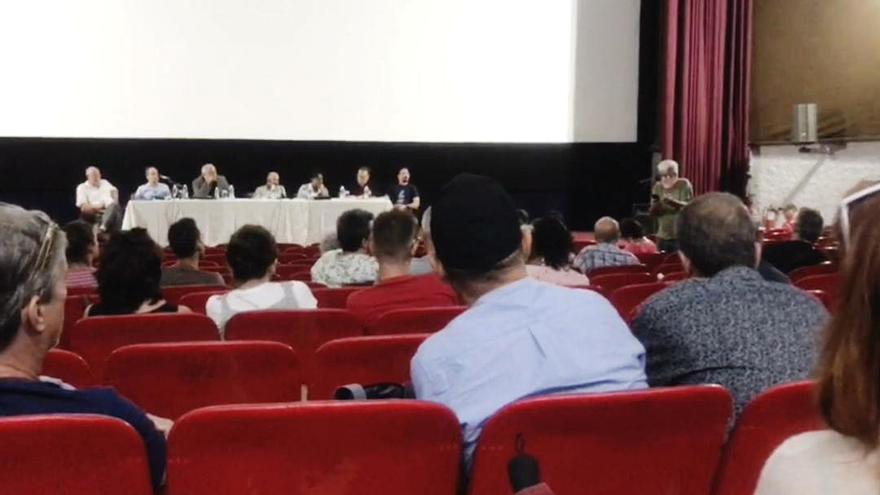
![]() 14ymedio, Havana, 24 June 2023 — More than a hundred Cuban filmmakers expressed their disagreement with the authorities about the decisions made with a documentary about the Argentine singer Fito Páez and his relationship with the Island. The creators, grouped in the Assembly of Cuban Filmmakers — which includes the prestigious director Fernando Pérez and the actor Jorge Perugorría — held a meeting this Friday with leaders of the Ministry of Culture and the Communist Party to face the controversy unleashed in mid-June.
14ymedio, Havana, 24 June 2023 — More than a hundred Cuban filmmakers expressed their disagreement with the authorities about the decisions made with a documentary about the Argentine singer Fito Páez and his relationship with the Island. The creators, grouped in the Assembly of Cuban Filmmakers — which includes the prestigious director Fernando Pérez and the actor Jorge Perugorría — held a meeting this Friday with leaders of the Ministry of Culture and the Communist Party to face the controversy unleashed in mid-June.
The controversy gained strength when a state television program broadcast the documentary Fito’s Havana, directed by Juan Pin Vilar, without his permission. Faced with that fact, an initial group of 58 creators criticized the cultural authorities for violating “ethical principles again and again.” The list has been increased to 600 signatories of the manifesto.
“This meeting was not as extensive as the one that took place on November 27, 2020, where there were exponents of all artistic disciplines. It was something more like a guild of filmmakers,” director Manuel Alejandro Rodríguez Yong, one of the participants in the discussion, explained to 14ymedio. “I think that even so, the possibility of working together with many of the problems that affect us was raised.”
The meeting was moderated by Ramón Samada, president of the official Cuban Institute of Cinematographic Art and Industry (ICAIC). Present, on behalf of the Government, were Deputy Prime Minister Inés María Chapman; the head of the Ideological Department of the Party, Rogelio Polanco; the Minister of Culture, Alpidio Alonso; the president of the Union of Writers and Artists (UNEAC), Luis Morlote, and the leader of the Hermanos Saíz Association, Yasel Toledo.
According to Rodríguez, logistical problems that depend on the administration of the State were discussed, but also ideological and political issues. “Everything will depend, too, on us (the filmmakers) managing to organize ourselves,” he said.
“The meeting was first supposed to take place on the ninth floor of the ICAIC, but then the Assembly of Filmmakers asked that it be held in a more open place. That’s why the Chaplin was chosen.”
According to Rodríguez, several creators didn’t attend because they didn’t find out and others because they “don’t trust that type of meeting.” Exiled filmmakers such as Carlos Lechuga and Pavel Giroud were asked to “find a way to attend through digital channels,” says the filmmaker.
“Among the names mentioned was that of Lechuga. What happened to the movie Vicenta B, more than a censorship of the work, was a punishment to the director. There was also talk of other filmmakers who are making movies outside of Cuba, but who are part of Cuban cinema. They have to be part of the discussions,” he said.
According to the EFE agency, Chapman said during the conversation that “there is a willingness to dialogue and work as a team to achieve concrete results in the face of all the demands expressed.”
For its part, a statement from the Ministry of Culture pointed out that “the approaches of the artists deserved the greatest attention of the leaders of the institutions. The artists listened carefully to the arguments of the representatives of the institutions and expressed their opinions in total freedom,” according to the text.
It is not the first time that there has been a confrontation between the artistic sector and the Cuban government in recent years. On November 27, 2020, hundreds of people staged a sit-in before the Ministry of Culture to protest the arrest of the members of the San Isidro Movement, including the artist Luis Manuel Otero Alcántara, who remains in prison.
Translated by Regina Anavy
____________
COLLABORATE WITH OUR WORK: The 14ymedio team is committed to practicing serious journalism that reflects Cuba’s reality in all its depth. Thank you for joining us on this long journey. We invite you to continue supporting us by becoming a member of 14ymedio now. Together we can continue transforming journalism in Cuba.
